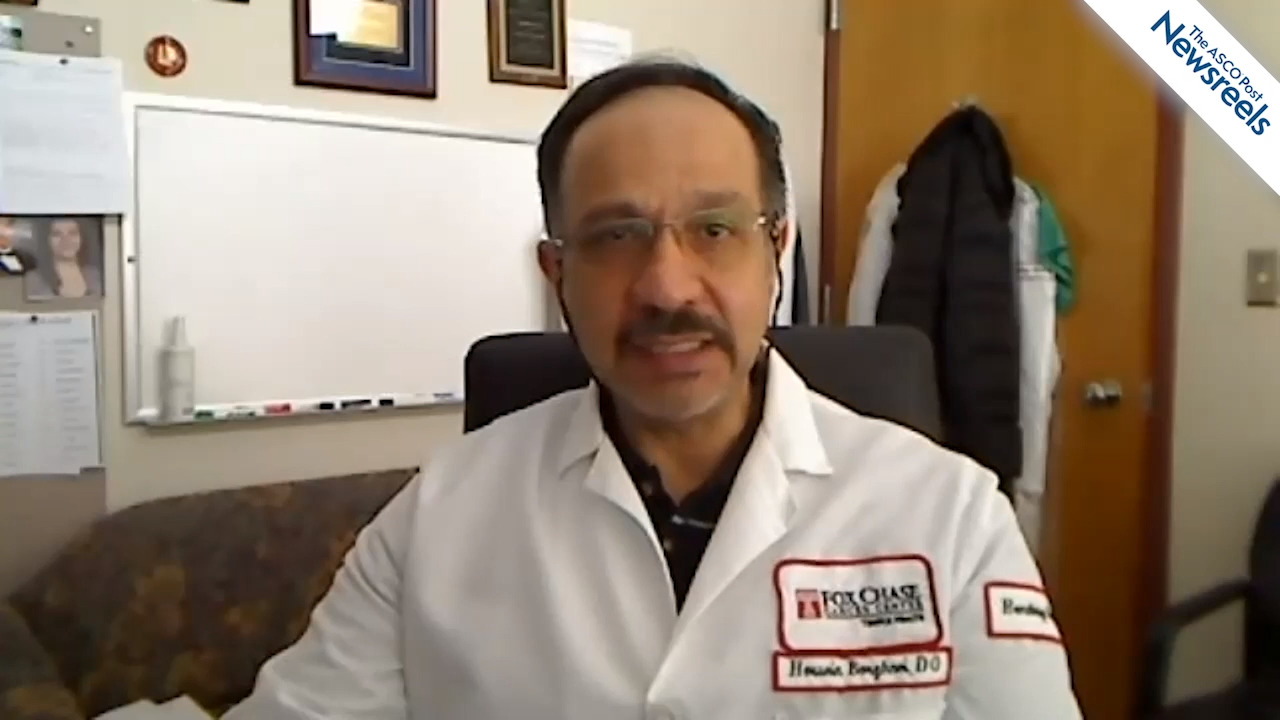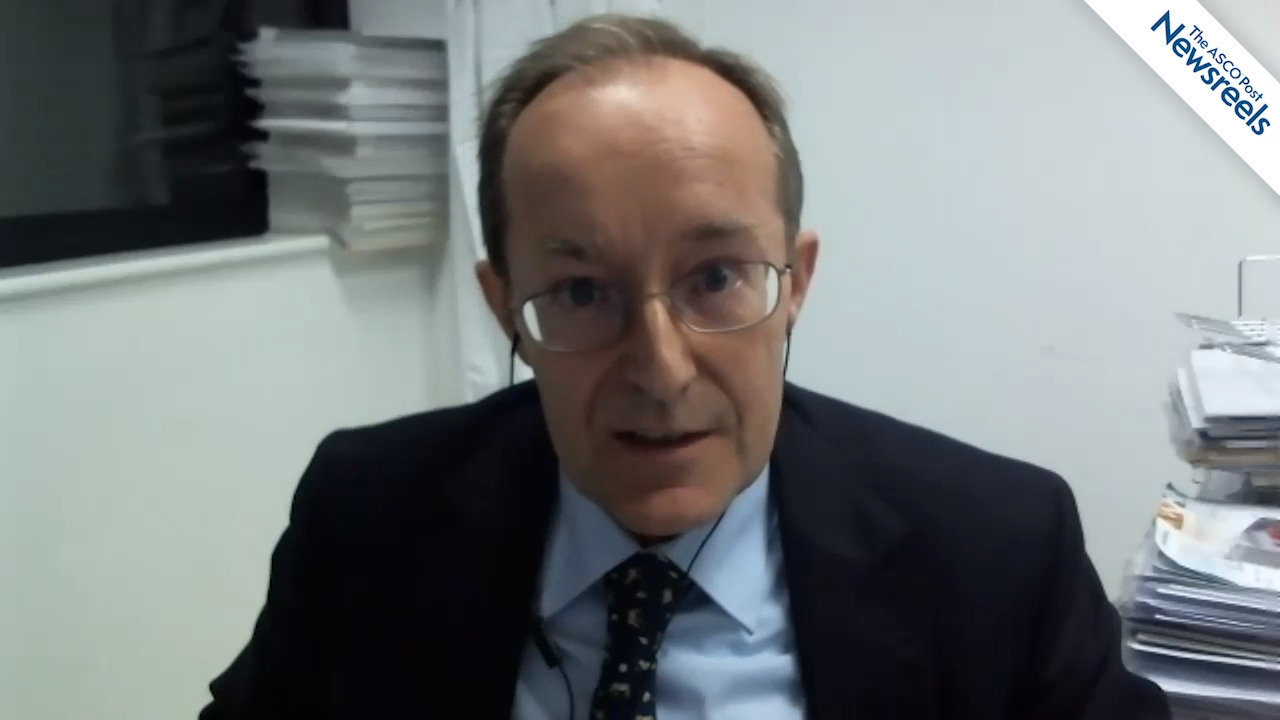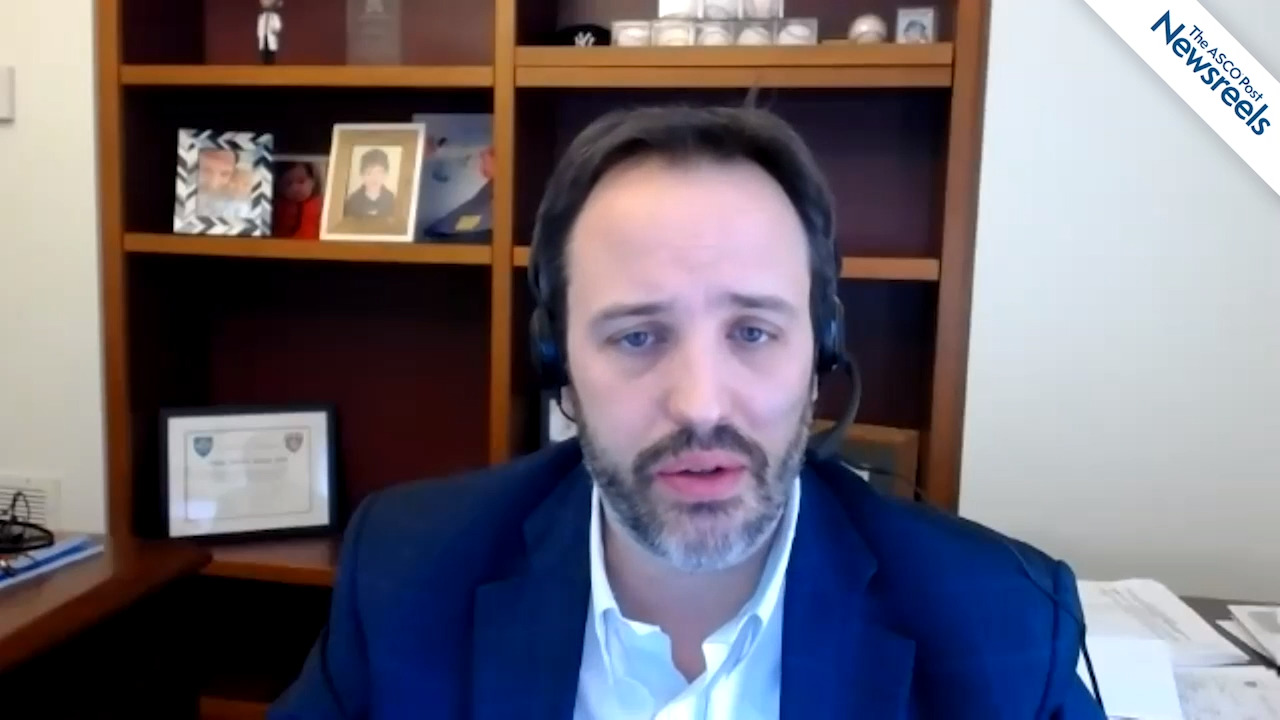Some Patients With Lung Cancer Report Feeling Uninformed About Their Disease, Uninvolved With Their Treatment
More than 1 in 10 patients with lung cancer do not know what type of tumor they have, according to data from a 17-country study carried out by the Global Lung Cancer Coalition (GLCC) presented by Beattie et al at the European Lung Cancer Virtual Congress 2021 (Abstract 209P_PR). Nearly one in five...
Adagrasib for Patients With Advanced KRAS G12C–Mutated NSCLC
Treatment with the KRAS G12C inhibitor adagrasib showed clinical activity in patients with advanced non–small cell lung cancer (NSCLC) harboring a KRAS G12C mutation, confirming its role as a therapeutic target. Results from the KRYSTAL-1 trial were reported at the European Lung Cancer Virtual...
ASCO Publishes Guideline Endorsement of ASTRO Guideline for Radiation Therapy in SCLC
An ASCO Expert Panel has endorsed an American Society for Radiation Oncology (ASTRO) guideline on radiation therapy for small cell lung cancer (SCLC), stating the recommendations in the ASTRO guideline “are clear, thorough, and based upon the most relevant scientific evidence” available.1...
Female Breast Cancer Surpasses Lung Cancer as the Most Commonly Diagnosed Cancer Worldwide
Cancer ranks as a leading cause of death in every country in the world, and, for the first time, female breast cancer is the most commonly diagnosed cancer, overtaking lung cancer, according to a collaborative report from the American Cancer Society (ACS) and the International Agency for Research...
Next Up in NSCLC: Antibody-Drug Conjugates
Antibody-drug conjugates directed against HER2, HER3, and trophoblast cell-surface antigen 2 (TROP2) are showing encouraging antitumor activity in advanced non–small cell lung cancer (NSCLC), according to research presented during the virtual edition of the International Association for the Study...
ITACA Trial: No Survival Benefit for Tailoring Adjuvant Chemotherapy in NSCLC
Tailoring adjuvant chemotherapy based on the expression of two molecular markers did not lead to a survival advantage in patients with completely resected stage II to III non–small cell lung cancer (NSCLC) in the phase III ITACA trial. This result was presented during the virtual edition of the...
Immunotherapy Doublet as Maintenance Therapy for Extensive-Disease SCLC
As reported in the Journal of Clinical Oncology by Taofeek K. Owonikoko, MD, PhD, and colleagues, the phase III CheckMate 451 trial showed no improvement in overall survival with combined nivolumab and ipilimumab vs placebo as maintenance therapy for extensive-disease small cell lung cancer. Study ...
FDA Pipeline: Priority Review for Kidney Cancer Treatment, Fast Track Designation for NSCLC Treatment
Recently, the U.S. Food and Drug Administration (FDA) granted Priority Review to the HIF-2α inhibitor belzutifan for the treatment of patients with von Hippel-Lindau (VHL) disease–associated renal cell carcinoma. The agency also granted Fast Track designation to poziotinib for the treatment of...
Updated Evidence Report and Systematic Review of Low-Dose CT Screening for Lung Cancer
In an analysis of updated evidence on low-dose computed tomography (CT) screening for lung cancer reported in JAMA, Jonas et al found that screening can reduce lung cancer mortality but may be associated with a range of potential harms. The analysis was performed to inform the new U.S. Preventive...
High- vs Standard-Dose Thoracic Radiotherapy for Limited-Stage Small Cell Lung Cancer
In a phase II trial reported in The Lancet Oncology, Grønberg et al found that use of high-dose vs standard-dose twice daily thoracic radiotherapy as part of first-line chemoradiotherapy was associated with significantly improved overall survival and similar toxicity in patients with limited-stage...
FDA Oncologic Drugs Advisory Committee to Review Status of Six Indications Granted Accelerated Approval
Recently, the U.S. Food and Drug Administration (FDA) announced that the agency will hold a public meeting of the Oncologic Drugs Advisory Committee on April 27 to 29 to discuss six indications granted accelerated approval that have since reported results from confirmatory trials that have not...
Expert Point of View: Roy S. Herbst, MD, PhD, FACP, FASCO, and Shinichi Toyooka, MD
The ASCO Post reached out to Roy S. Herbst, MD, PhD, FACP, FASCO, Chief of Medical Oncology and Associate Cancer Center Director for Translational Research at Yale Cancer Center and Smilow Cancer Hospital, New Haven, for his thoughts on the LCMC3 trial of neoadjuvant atezolizumab.1 Dr. Herbst led...
Neoadjuvant Atezolizumab in Lung Cancer: LCMC3 Trial Meets Primary Endpoint
Neoadjuvant treatment with single-agent atezolizumab in patients with stage IB to IIIB lung cancer resulted in a major pathologic response rate of 21% and a pathologic complete response rate of 7%, in the primary analysis of the Lung Cancer Mutation Consortium 3 (LCMC3) study.1 The findings were...
Expert Point of View: Rina Hui, MBBS, PhD, and Melina Marmarelis, MD
“It has been a long time coming to see a positive randomized phase III study with a checkpoint inhibitor in relapsed mesothelioma,” said the study’s invited discussant, Rina Hui, MBBS, PhD, Clinical Professor of Medicine, Crown Princess Mary Cancer Centre, Westmead Hospital, University of Sydney,...
CONFIRM Trial Reports Improvement in Survival With Nivolumab in Relapsed Malignant Mesothelioma
For the first time, a treatment has been shown to improve overall survival in heavily pretreated patients with relapsed malignant mesothelioma. In the phase III CONFIRM trial, single-agent nivolumab led to a significant improvement in both overall and progression-free survival, according to...
Tepotinib for Metastatic NSCLC With MET Exon 14–Skipping Alterations
On February 3, 2021, tepotinib was granted accelerated approval for treatment of adult patients with metastatic non–small cell lung cancer (NSCLC) harboring mesenchymal-epithelial transition (MET) exon 14–skipping alterations.1,2 Supporting Efficacy Data Approval was supported by findings from the...
Fred R. Hirsch, MD, PhD, on Searching for Therapeutic Strategies for Patients With Lung Cancer and COVID-19 Infection
Fred R. Hirsch, MD, PhD, of Mount Sinai Medical Center, invites his colleagues to enroll their patients in a large prospective study, for which he serves as Principal Investigator. The study is searching for solutions for treating patients with lung cancer who also have the coronavirus, because so many experience an aggressive course of infection.
Continued Survival Benefit With Durvalumab Plus Chemotherapy vs Chemotherapy Alone in Extensive-Stage SCLC
As reported in The Lancet Oncology by Jonathan W. Goldman, MD, of the David Geffen School of Medicine at University of California Los Angeles, and colleagues, updated results from the phase III CASPIAN trial show maintained improvement in overall survival with first-line durvalumab plus...
USPSTF Issues Final Recommendation Statement on Screening for Lung Cancer
Today, the U.S. Preventive Services Task Force (USPSTF) published a final recommendation statement on screening for lung cancer in people who do not have signs or symptoms. Based on the evidence, the USPSTF recommends yearly screening using a low-dose computed tomography (CT) scan for people aged...
Updated Analysis of Outcomes With Entrectinib for Advanced ROS1 Fusion–Positive NSCLC
As reported in the Journal of Clinical Oncology by Rafal Dziadziuszko, MD, and colleagues, an updated integrated analysis of three phase I or II trials of entrectinib in patients with advanced ROS1-positive non–small cell lung cancer (NSCLC) indicated that treatment continues to be associated with...
Hossein Borghaei, DO, on Bispecific T-Cell–Engager Immune Therapy for Small Cell Lung Cancer
Hossein Borghaei, DO, of Fox Chase Cancer Center, discusses phase I results from a study of AMG 757, an experimental bispecific T-cell–engager (BiTE) immune therapy aimed at the DLL3 molecular target in patients with small cell lung cancer. At this early stage, results show clinical efficacy and safety, with 37% of 51 evaluable patients exhibiting disease control (Abstract OA11.03).
FDA Approves Lorlatinib for Metastatic ALK-Positive NSCLC
On March 3, the U.S. Food and Drug Administration (FDA) granted regular approval to lorlatinib (Lorbrena) for patients with metastatic non–small cell lung cancer (NSCLC) whose tumors are anaplastic lymphoma kinase (ALK)-positive, as detected by an FDA-approved test. The FDA also approved the...
Study Examines Extrapleural Pneumonectomy After IMRT for Malignant Pleural Mesothelioma
In a Canadian single-center phase II feasibility study reported in The Lancet Oncology, Cho et al found that a treatment protocol (surgery for mesothelioma after radiotherapy, also known as SMART) consisting of hemithoracic intensity-modulated radiotherapy (IMRT) followed by extrapleural...
Pembrolizumab's Indication in Small Cell Lung Cancer Is Withdrawn
On March 1, Merck announced the company is voluntarily withdrawing the U.S. indication for pembrolizumab (Keytruda) for the treatment of patients with metastatic small cell lung cancer with disease progression on or after platinum-based chemotherapy and at least one other prior line of therapy. The ...
EMPOWER-Lung 1: First-Line Cemiplimab-rwlc vs Platinum-Doublet Chemotherapy in Advanced NSCLC With PD-L1 Expression ≥ 50%
As reported in The Lancet by Sezer et al, the phase III EMPOWER-Lung 1 trial has shown improved overall and progression-free survival with cemiplimab-rwlc vs platinum doublet chemotherapy among patients with advanced non–small cell lung cancer (NSCLC) with PD-L1 expression on ≥ 50% of tumor cells...
KEYNOTE-598: No Improvement With Addition of Ipilimumab to Pembrolizumab in NSCLC
In the phase III KEYNOTE-598 study, the addition of ipilimumab to pembrolizumab increased toxicity without boosting efficacy as first-line therapy for metastatic non–small cell lung cancer (NSCLC) in patients with high expression of PD-L1. The findings were presented at the International...
Phase II CodeBreak 100 Validates Benefit of KRAS Inhibitor Sotorasib in Advanced Lung Cancer
The registrational phase II CodeBreak 100 trial has validated the power of KRAS inhibition with sotorasib (AMG 510) in advanced non–small cell lung cancer (NSCLC).1 In a follow-up to the groundbreaking findings of the phase I trial, the phase II cohort has now shown a durable response rate of...
FDA Approves Cemiplimab-rwlc for Patients With NSCLC and High PD-L1 Expression
On February 22, the U.S. Food and Drug Administration (FDA) approved cemiplimab-rwlc (Libtayo) for the first-line treatment of patients with advanced non–small cell lung cancer (NSCLC) whose tumors have high PD-L1 expression (tumor proportion score [TPS] > 50%) as determined by an FDA-approved...
NEOSTAR: Neoadjuvant Nivolumab or Nivolumab/Ipilimumab in Operable NSCLC
The randomized phase II NEOSTAR trial, which examined single-agent and combined neoadjuvant immune checkpoint inhibitor therapy in patients with stage I to III non–small cell lung cancer (NSCLC), found combination therapy produced a significant clinical benefit (as assessed by major pathologic...
Roy S. Herbst, MD, PhD, on LUNG-MAP, Circulating Tumor DNA, and Tissue Molecular Analysis
Roy S. Herbst, MD, PhD, of Yale University, discusses results from the LUNG-MAP Master Protocol, which support the planned use of circulating tumor DNA for enrollment onto LUNG-MAP substudies, with a positive finding meriting inclusion in study; a negative finding, while considered inconclusive, requires the use of tissue samples (Abstract MA08.10).
FDA Pipeline: Priority Reviews in KRAS G12C–Mutated NSCLC, Non–Muscle-Invasive Bladder Cancer
Recently, the U.S. Food and Drug Administration (FDA) granted Priority Review to treatments for KRAS G12C–mutated non–small cell lung cancer (NSCLC) and high-risk, bacillus Calmette-Guérin–unresponsive non–muscle-invasive bladder cancer. A new drug application for a therapy for Waldenström’s...
KEYNOTE-598 Trial: Addition of Ipilimumab to Pembrolizumab in Previously Untreated Patients With Metastatic NSCLC and High PD-L1 Expression
As reported in the Journal of Clinical Oncology by Michael Boyer, MBBS, PhD, and colleagues, an interim analysis in the phase III KEYNOTE-598 trial showed no improvement in overall or progression-free survival with the addition of ipilimumab to pembrolizumab in previously untreated patients with...
FDA Approves Trilaciclib to Reduce Chemotherapy-Induced Bone Marrow Suppression in Adults Being Treated for SCLC
On February 12, the U.S. Food and Drug Administration (FDA) approved trilaciclib (Cosela) as the first therapy in its class to reduce the frequency of chemotherapy-induced bone marrow suppression in adults receiving certain types of chemotherapy for extensive-stage small cell lung cancer (SCLC)....
Martin Reck, MD, PhD, on SCLC: Maintenance Therapy for Patients With Extensive-Stage Disease
Martin Reck, MD, PhD, of LungenClinic, discusses results from the IMpower133 study of carboplatin plus etoposide with or without atezolizumab in patients with untreated extensive-stage small cell lung cancer (Abstract OA11.06).
Martin Reck, MD, PhD, on NSCLC: Pembrolizumab, Platinum Chemotherapy, and Radiotherapy in Advanced Disease
Martin Reck, MD, PhD, of the LungenClinic, discusses the results from KEYNOTE-799, which explored a new strategy to increase the intensity of treatment in patients with unresectable, locally advanced, stage III non–small cell lung cancer (Abstract OA02.03).
Nivolumab/Ipilimumab vs Chemotherapy as First-Line Treatment for Unresectable Malignant Pleural Mesothelioma: CheckMate 743 Trial
As reported in The Lancet by Paul Baas, MD, and colleagues, a prespecified interim analysis in the phase III CheckMate 743 trial has shown improved overall survival with first-line nivolumab/ipilimumab vs platinum-based chemotherapy in patients with unresectable malignant pleural mesothelioma. The...
Jill Feldman: A Determined Cancer Survivor Shares Her Story of a Family Devastated by Lung Cancer
Jill Feldman, a patient advocate who has lost five family members to lung cancer and is herself a 12-year cancer survivor living with EGFR-positive disease, describes her family history of cancer, how she has worked with her physicians for more than a decade to survive her own diagnosis, and the message she would like all oncologists to hear.
Luis M. Montuenga, PhD, on Noninvasive Biomarkers in Lung Cancer Screening
Luis M. Montuenga, PhD, of the University of Navarra, discusses the potential contributions of biomarkers, promising biomarker panels being tested and published, the need to standardize biospecimen collection, and how to improve the sensitivity of these biomarkers (Abstract PL05.06).
Bruce E. Johnson, MD, on Evolving Challenges in Lung Cancer Drug Development
Bruce E. Johnson, MD, of Dana-Farber Cancer Institute, offers his expert perspective on single-arm drug approvals for targeted agents between 2016 and 2020, the need for biomarker testing, and the societal costs of drug development (Abstract PL04.03).
Roy S. Herbst, MD, PhD, on NSCLC: Osimertinib and Patient-Reported Outcomes
Roy S. Herbst, MD, PhD, of Yale University, discusses two key abstracts from the ADAURA trial: the use of osimertinib as adjuvant therapy for resected EGFR-mutated non–small cell lung cancer; and patient-reported outcomes, which showed a benefit in disease-free survival and maintenance of health-related quality of life in patients with resected stage IB to IIIA disease (Abstracts OA06.04 and OA06.03).
Justin F. Gainor, MD, on NSCLC: Study Results on Nivolumab vs Ipilimumab, Bemcentinib Plus Pembrolizumab
Justin F. Gainor, MD, of Massachusetts General Hospital, discusses two key phase II studies on non–small cell lung cancer: nivolumab vs nivolumab plus ipilimumab in EGFR-mutant disease and the oral selective AXL inhibitor bemcentinib with pembrolizumab in advanced disease (Abstracts OA01.06 and OA01.07).
Martin Reck, MD, PhD, on NSCLC: Pembrolizumab Plus Ipilimumab in First-Line Treatment
Martin Reck, MD, PhD, of the LungenClinic, discusses findings of the KEYNOTE-598 study, which showed that pembrolizumab plus ipilimumab was more toxic and offered no more benefit in terms of efficacy than pembrolizumab plus placebo in first-line therapy for patients with metastatic high PD-L1–expressing non–small cell lung cancer (Abstract PS01.09).
First-Line Lorlatinib Improves Progression-Free Survival vs Crizotinib in Advanced ALK-Positive NSCLC
As reported in The New England Journal of Medicine by Alice T. Shaw, MD, PhD, Global Head of Translational Clinical Oncology at Novartis Institutes for BioMedical Research,* and colleagues, an interim analysis of the phase III CROWN trial has shown that first-line lorlatinib significantly improved...
Jill Feldman on Diversifying the Criteria for Inclusion in Clinical Trials
Jill Feldman, a patient advocate and lung cancer survivor, discusses the current challenges and potential solutions to including more people of color and those in underserved communities in clinical trial research (Abstract PL04.06).
Five-Year Outcomes From the CheckMate 017 and 057 Trials of Nivolumab vs Docetaxel in Previously Treated Patients With NSCLC
In an analysis of the phase III CheckMate 017 and 057 trials in previously treated patients with advanced squamous (017) and nonsquamous (057) non–small cell lung cancer (NSCLC), reported in the Journal of Clinical Oncology, Hossein Borghaei, DO, MS, and colleagues found pooled 5-year overall...
Fred R. Hirsch, MD, PhD, on Lung Cancer: Survival and Tumor Mutation Burden
Fred R. Hirsch, MD, PhD, of Mount Sinai Medical Center, discusses Lung-MAP studies in which a higher tumor mutation burden determined by next-generation sequencing was linked to overall and progression-free survival across two immunotherapy trials, and was independent of PD-L1 status (Abstract OA01.04).
HIC Assays May Aid in Predicting Response to Immunotherapy Among Patients With NSCLC
Using a host immune classifier (HIC) test for patients with non–small cell lung cancer (NSCLC) may provide better predictors of treatment response and improve outcomes, according to research presented by Akerley et al at the International Association for the Study of Lung Cancer (IASLC) 2020 World...
Impact of COVID-19 on Cancer Care Has Been ‘Profound,’ According to WHO
More than a year since the new coronavirus crisis began, its impact on cancer care has been stark, with “50% of governments (having) cancer services partially or completely disrupted because of the pandemic,” said André Ilbawi, MD, of the World Health Organization’s (WHO) Department of...
Germline Whole-Exome Sequencing Reveals the Potential Role of Hereditary Predisposition and Therapeutic Implications in SCLC
A study presented by Nobuyuki Takahashi, MD, of the Center for Cancer Research at the National Cancer Institute, at the International Association for the Study of Lung Cancer (IASLC) 2020 World Conference on Lung Cancer (WCLC) Singapore (Abstract OA11.05) demonstrated that there may be an inherited ...
Patient-Reported Outcomes From the CROWN Trial: First-Line Lorlatinib vs Crizotinib for ALK-Positive NSCLC
Patient-reported outcomes from the phase III CROWN study showed that time to treatment deterioration in chest pain, dyspnea, and cough was comparable between those who received lorlatinib and patients who took crizotinib. The research was presented at the International Association for the Study of...













